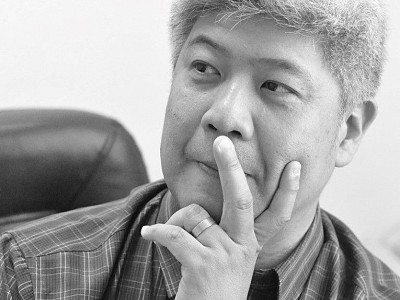Sexuality from a Christian/Catholic standpoint forms a deep bonding between two people, according to Fr Gregory Chan, who was the host of a talk on marriage and sexual ethics on August 23 at the Archdiocesan Pastoral Institute.
The talk was aimed at helping lay people understand sexuality and morality. In the discussion, Fr Gregory Chan divided the topics to sexuality and marriage.
Fr Chan stressed that sexuality, as opposed to the viewpoint of the world, goes far beyond a physical act. It forms a deep bond between two people – in which a connection is shared. It is therefore not designed to be casual.
In the Old Testament, the books of Genesis, Song of Songs, Hosea, Ezekiel, Leviticus, Judges, Judith and Tobit contain stories and instances of sexuality from both a worldly and holy standpoint.
In the Gospel according to John, specifically chapters 4, 8 and 12 –though not explicitly – deal with elements of sexuality.
Fr Chan said that Jesus Christ and his teachings emphasise love and relationship and prioritise the value of each person.
He further stressed that human beings should be appreciated, and not used. But it is often the case that human beings are used, and things are appreciated.
Within marriage, sex is viewed not only for procreation but also for the fulfilment of the needs of the husband and wife respectively. Intimacy between partners is essential for the success of the marriage and the happiness of both parties.
The act of sex for procreation is defined as the spouses co-operating with God to bring creation to the world.
When two people become married, it is a total giving of oneself, and it is meant to be unselfish. In other words, the aim of marriage is not to prioritise one party’s needs, but to help one another become a better person.
This unselfish giving of oneself is also demonstrated numerous times in the teachings of Christ in the New Testament, and ultimately of Christ Himself, who gave His own body as a living sacrifice – for the salvation of the world.
Fr Chan stressed that marriage is a sacrament. He quoted from Casti Connubii (1930), an encyclical of Pope Pius XI on Christian marriage and how the husband and wife must come together in mutual submission.
Verse 24 of the Casti Connubii states: “This mutual moulding of husband and wife, this determined effort to perfect each other can, in a very real sense, be said to be the chief reason and purpose of matrimony, provided matrimony is looked at not in the restricted sense as instituted for the proper conception and education of the child, but more widely as the blending of life as a whole and the mutual interchange and sharing thereof.”
As for inter-faith marriages, Fr Chan explained the concept of equal and unequal yoke, as described in the Second Letter of St Paul to the Corinthians. Fr Chan explained that in the context of marriage, being “unequally yoked” is not just confined to being two people with different beliefs. If the mixed marriage takes either spouse closer to God, then it is of “equal yoke.” If the mixed marriage brings either of the spouses further from God, then it is considered to be “unequally yoked.”
Sexuality is not shunned in Christianity. It is in fact embraced as being a natural aspect of attraction between human beings. It should not, however, be used for the immoral pleasuring of oneself, but should remain within the confines of marriage.
Article reproduced from Herald Malaysia online
 Kristus
10 × RM 9.50
Kristus
10 × RM 9.50  Rosary Silver Box Mary
2 × RM 10.00
Rosary Silver Box Mary
2 × RM 10.00  Yesus Cinta Saya
8 × RM 9.50
Yesus Cinta Saya
8 × RM 9.50  Medallion Crucifix 5309
12 × RM 3.80
Medallion Crucifix 5309
12 × RM 3.80  Gold Rose Crucifix 12 cm
2 × RM 23.00
Gold Rose Crucifix 12 cm
2 × RM 23.00  Benedict Hanging Crucifix II 18.5 cm
2 × RM 14.00
Benedict Hanging Crucifix II 18.5 cm
2 × RM 14.00  Cross Hanging 31cm
5 × RM 20.50
Cross Hanging 31cm
5 × RM 20.50  Benedict Cross 5421
4 × RM 4.80
Benedict Cross 5421
4 × RM 4.80  Cross Luminous 0569
4 × RM 3.80
Cross Luminous 0569
4 × RM 3.80  Plaque Mary(Oval)
2 × RM 10.50
Plaque Mary(Oval)
2 × RM 10.50  Plaque Jesus (3D)
4 × RM 9.80
Plaque Jesus (3D)
4 × RM 9.80  Cross Luminous 0532
4 × RM 3.80
Cross Luminous 0532
4 × RM 3.80 
 Kristus
Kristus  Rosary Silver Box Mary
Rosary Silver Box Mary  Yesus Cinta Saya
Yesus Cinta Saya  Medallion Crucifix 5309
Medallion Crucifix 5309  Gold Rose Crucifix 12 cm
Gold Rose Crucifix 12 cm  Benedict Hanging Crucifix II 18.5 cm
Benedict Hanging Crucifix II 18.5 cm  Cross Hanging 31cm
Cross Hanging 31cm  Benedict Cross 5421
Benedict Cross 5421  Cross Luminous 0569
Cross Luminous 0569  Plaque Mary(Oval)
Plaque Mary(Oval)  Plaque Jesus (3D)
Plaque Jesus (3D)  Cross Luminous 0532
Cross Luminous 0532 
